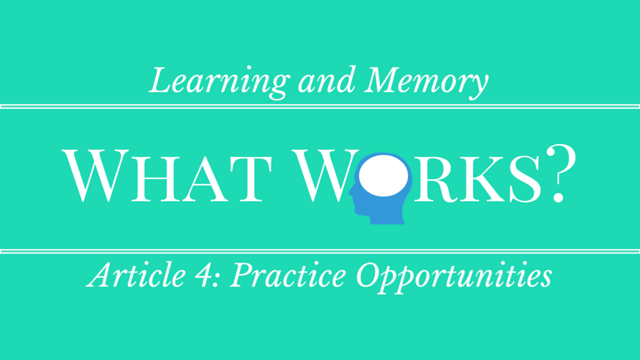Learning and Memory- What Works?: Practice Opportunities
Written by Sandie Barrie Blackley, Speech-Language Pathologist
Published on March 25, 2016
So far in this series about methods for improving learning and memory, I have covered two facts from consensus research:
- No one method works for all types of learning and memory. The best method depends on what needs to be learned and remembered.
- The most effective methods involve making some errors. Practice provides an opportunity to forget and remember again, strengthening memory.
Even if the right type of practice is provided, there must be enough of it. Whether preparing for a piano recital or a soccer match, a player would need to not only choose the right type of practice but also spend enough time with it. Could it be the difference in practice opportunities that makes one-on-one intervention so much more effective than group instruction? (Bloom, 1984)
What is enough practice and how can that be measured? We can use time to measure the amount of practice (for example 30 minutes of piano practice or soccer drills). But what if the player sits on the piano bench daydreaming and only plays a few notes? What if the soccer player hangs back during drills and rarely touches the ball? What if in a 30-minute reading intervention group a student daydreams, hangs back, and gets only a few practice opportunities?
soccer drills). But what if the player sits on the piano bench daydreaming and only plays a few notes? What if the soccer player hangs back during drills and rarely touches the ball? What if in a 30-minute reading intervention group a student daydreams, hangs back, and gets only a few practice opportunities?
A practice opportunity is really a chain of three elements:
- the challenge (or question)
- the response (or answer)
- the feedback (right, wrong, or an invitation to think more about the challenge and response)
Reading intervention is typically set up based on seat time, not practice opportunities. While we know from research that the number of practice opportunities matters a lot for learning and memory, we don’t have good data regarding how many practice opportunities individual students typically get during reading intervention.
So here’s a challenge: Count your students’ practice opportunities. How many independent response challenges does he or she get per day (or per week) as part of their reading intervention? We’d love to hear what you find, please comment below!
Improve Your Child’s Reading
Learn more about Lexercise today.
Schedule a FREE
15-minute consultation



